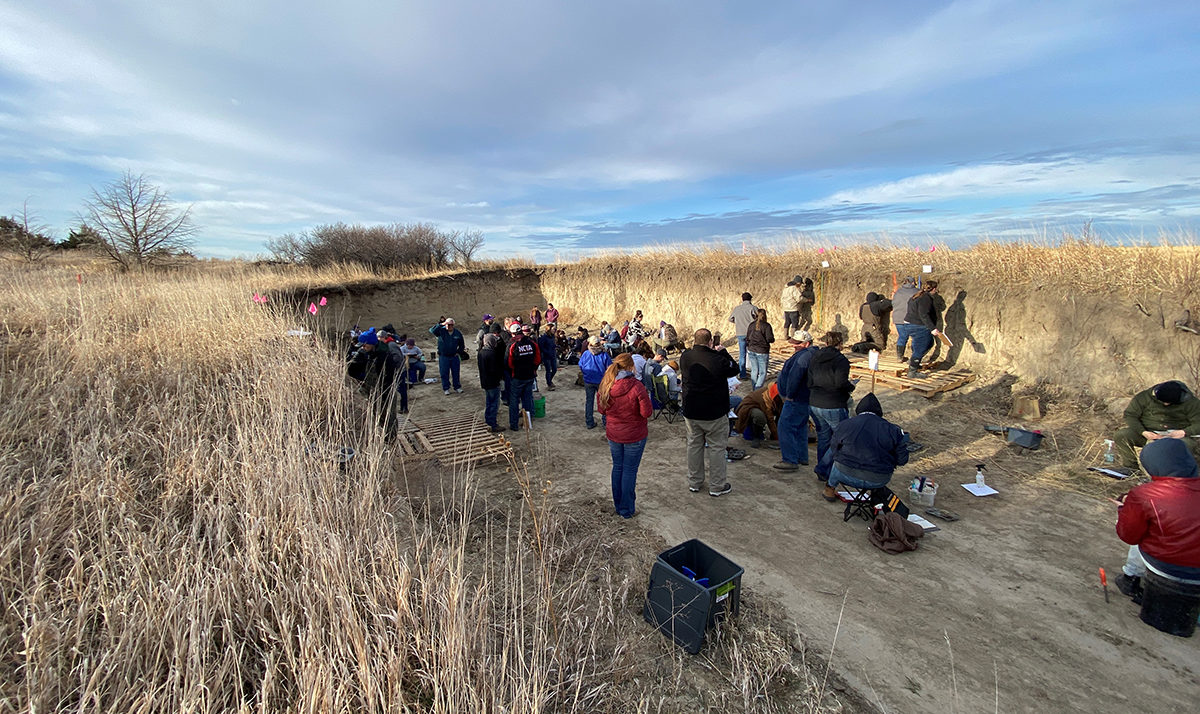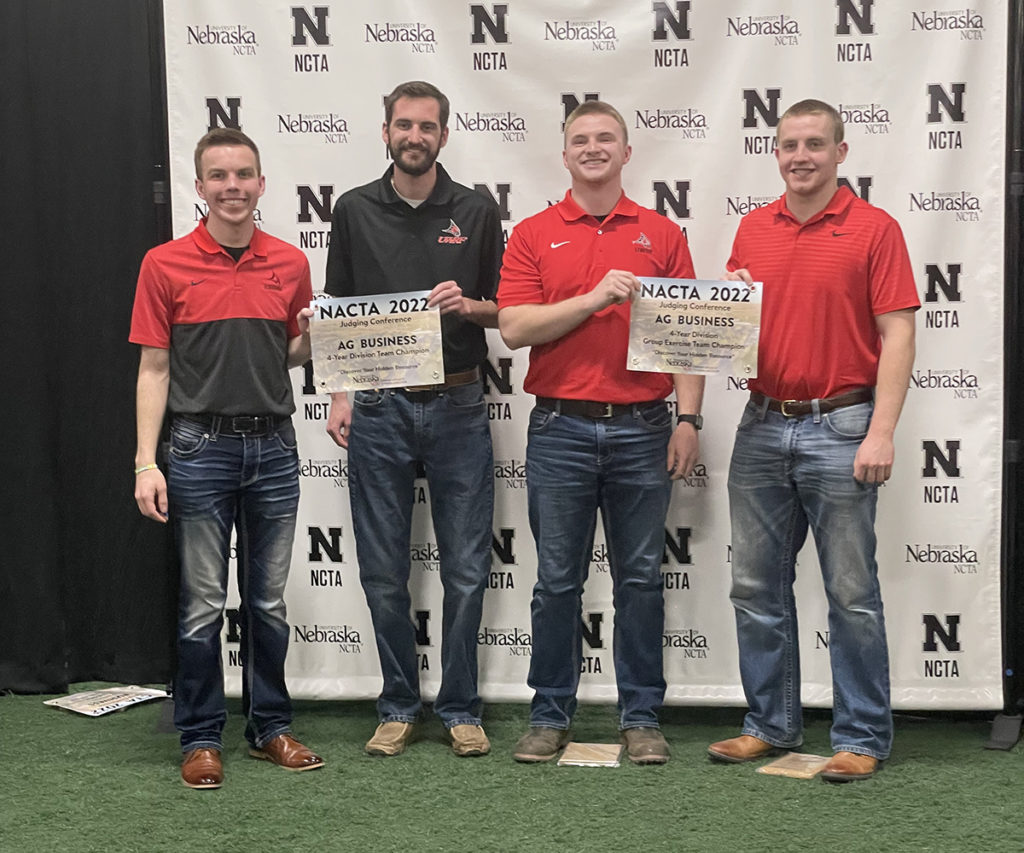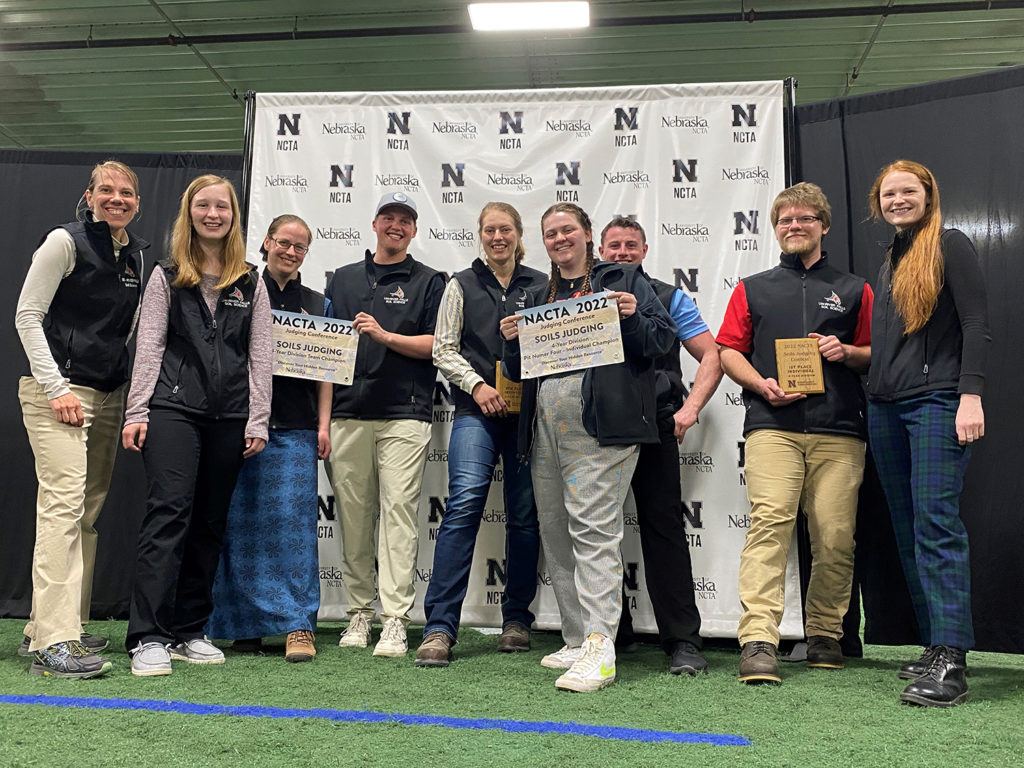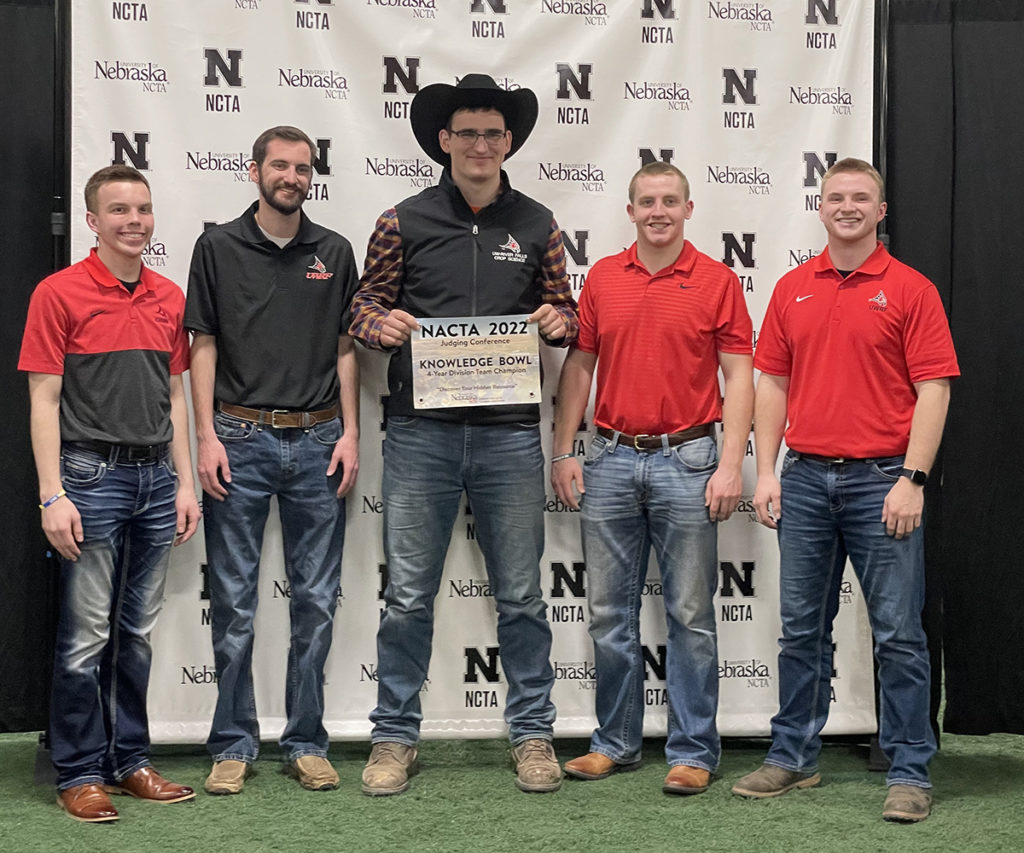
Two University of Wisconsin-River Falls judging teams brought home first-place overall national wins earlier this month.
The Soil Judging Team and the Agricultural Business Team, both part of the College of Agriculture, Food and Environmental Sciences, each garnered top finishes in the North American Colleges and Teachers of Agriculture Judging Conference in North Platte, Neb. The students were in Nebraska from March 28 through April 3.
It was the first time UWRF had an Agricultural Business Team compete at NACTA.
“We didn’t know what to expect,” said Brenda Boetel, team coach and professor and chair of Agricultural Economics. “It was incredibly exciting to have them do so well.”
Holly Dolliver, coach for the Soil Judging Team and geology and soil science professor, said it is amazing to see the UWRF teams compete against well-respected agricultural institutions such as Purdue, Kansas State University and Iowa State.
“Winning is not the objective,” said Dolliver, who is also the chair of the Plant and Earth Science Department. “Learning is top priority and I am so pleased with the motivation and commitment of our UWRF students. They are there for the right reasons.”
CAFES Dean Dale Gallenberg congratulated the teams. He pointed out while there are certainly social aspects for students involved with judging teams, participation provides substantial professional development opportunities for students. Students enhance their communication skills, critical thinking skills, problem-solving abilities, decision-making skills and learn teamwork. “Our students are competing against their peers from across the country regardless of the size of the home institution. It demonstrates the quality and commitment of our students and the programming we have here at UWRF.”
“Depending on the specific discipline and judging competition, direct contact with industry may be an additional benefit,” Gallenberg said. “There is an opportunity for students to network and work closely with potential employers. This year’s contests included the option for tours to a feedlot, a fish hatchery, and a public power source working with irrigation.”

Joe Schlies, Chester Donkers, Grant Buwalda and Curtis Weltzien.
Four students, all agricultural business majors, competed for the Agricultural Business Team. They included:
- Joe Schlies, of Denmark, junior
- Grant Buwalda, of Waupun, junior
- Chester Donkers, of Faribault, Minn., senior
- Curtis Weltzien, of Arcadia, senior
The competition included a written exam that runs the gamut of agribusiness knowledge, Boetel said. The students presented a business analysis on a crop consulting firm, which won first place in the competition. Amber Remble, associate professor of agricultural economics, is also a team coach.
Building confidence
“The competitions help the students recognize how much they have learned,” Boetel said. “It helps them to build confidence that the decisions they are making are right and not to second guess themselves. It highlights the level of education they are getting at UWRF.”
This was the first time the judging teams were able to compete in NACTA since 2019 because of COVID-19, Dolliver said.
“The first day in Nebraska I was reminded how important these experiences can be and just how transformative they are. These experiences are incredible in terms of what they can do for our students,” Dolliver said.

Holly Dolliver (coach), Megan Culpitt, Eileen Mullet, Dagan Lance, Kira Jacobson (5th place overall individual), Savannah Lynch (1st place pit award), Dave Nonemacher, Linus Chaple (1st place overall individual) and Kari Wolf (assistant coach).
Seven students were part of the soil judging team. They included:
- Megan Culpitt, of Norwalk, first-year, crop and soil science major
- Eileen Mullet, of Hayward, junior, crop and soil science major
- Dagan Lance, of Mukwonago, sophomore, crop and soil science major
- Kira Jacobson, of Cannon Falls, Minn., crop and soil science major
- Dave Nonemacher, of Turtle Lake, senior, agricultural business major
- Linus Chaple, of St. Paul, senior, crop and soil science major
- Savannah Lynch, of Green Bay, junior, environmental science, major
Chaple took first place overall as an individual and Lynch took first place at pit No. 4.
The strength of the team is its diversity of students from various majors, Dolliver said.
“As a team, these students train together and help one another learn and prepare,” Dolliver said. It is a great opportunity for our upper-class students to build their leadership skills.”
Hard work pays off
Chaple said he was pleased the team’s hard work paid off.
“It feels really good that I won an individual first place, it’s a real confidence booster,” he noted. “It feels good to do well in a competition related to the field that I intend to work in. It was a wonderful experience to get to travel out to Nebraska. We got to get to see the tallest sand dunes in North America I would have never gone out to see otherwise. Judging competitions help teach you how to learn as a team. In our week of outdoor practice, we were helping each other understand what’s happening with the soils so that we could all do the best we could.”
Buwalda, who won a third-place individual award in agricultural business, said it was a great experience to represent UWRF and compete with his friends.
“I think it shows how great of professors and instructors we have here at UWRF helping us be prepared, to put us in the position to win and compete well,” he said. “Personally, it was great to see how my years of hard work and dedication in the classroom paid off and I could see I have put myself in a place for success, both now and in the future. It is also an incredible experience to build relationships and friendships with those around you and make memories that will last a lifetime. “
The Soil Judging Team members started in January studying Nebraska’s soils. Because of the wintry weather in Wisconsin, they get few if any practice days in the local fields before heading to the Cornhusker State. During the week leading up to the competition, students visited 10 practice sites in Nebraska, Dolliver said.
On competition day team members traveled to four sites to identify soil features and characteristics such as the percentage of sand and clay, make interpretations such as the potential for runoff issues and to determine if the site would be good for a house. They competed against 14 teams from four-year universities. There also were four teams from two-year institutions.
Lifelong friendships made
As part of the judging competition, they must describe the texture of the soil, and define how much of the soil is comprised of sand versus clay, determine the type of soil it is and how useful it would be for agriculture, Dolliver said.
Dolliver said she was proud of the work the students did and the character they showed continuing to study Nebraska’s soils even with 20-degree temperatures and fierce spring winds.
“I think the legacy experience is far beyond the championship,” Dolliver said. “It is much more about the skills they learned and the lifelong friendships they make. They also have the pride of representing their university.

Joe Schlies, Chester Donkers, Mitchell Oswald, Curtis Weltzien and Grant Buwalda.
At NACTA, UWRF was also the champions of the Ag Knowledge Bowl contest. Team members included Donkers; Weltzien; Schlies; and Mitchell Oswald of Brownsdale, Minn., a crop and soil science major.
The Crops Team also took fourth place out of 13 teams at the contest. The team is coached by Veronica Justen, associate professor of crop science.
Team members included Oswald; Jack Morrison of Farmington, Minn., a junior; Nick Hiebl of Edgar, a senior; Alexandria Broderick of Pound, a junior; and Jack Wolter of Waconia, Minn., a junior. All are crop and soil science majors.

